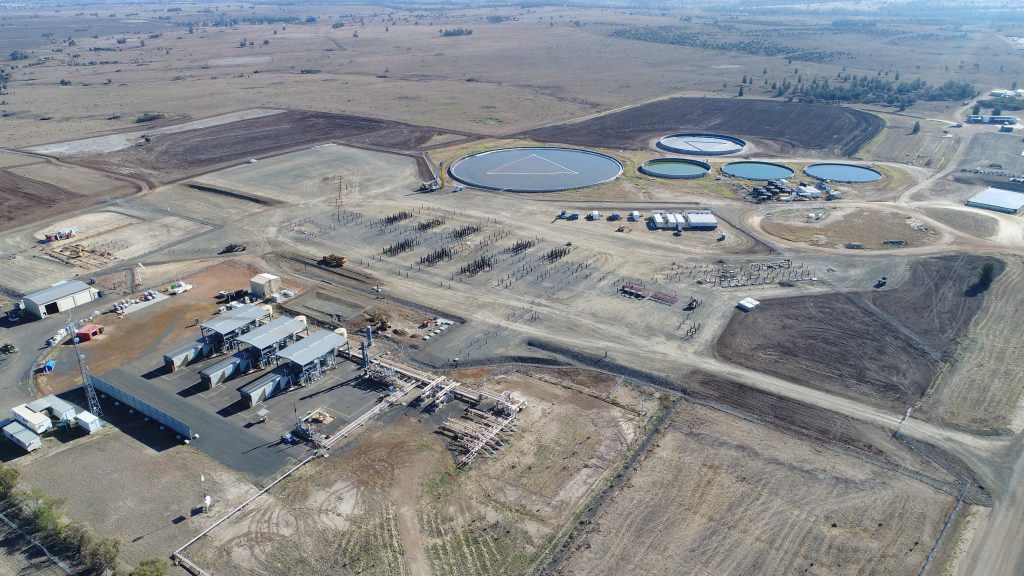Local demand for steel foundation systems continues to grow
Australian energy companies have traditionally used concrete to construct the foundations of their gas compression and process facilities, however, for the past two years a Canadian construction company specialising in steel pile supply and installation has been bringing the advantages of steel foundation systems to the attention of the Australian market.

DFI began in Canada in 1969, as a small one-truck oilfield transportation company. As the company expanded within Canada and overseas, DFI’s focus turned to pile installation, and eventually to the design and manufacturing of piling equipment, ERW tube mills and ERW piling material.
In 2015, DFI was contacted by a major Australian CSG producer who was interested in the major cost and time savings that steel piles offer over concrete foundations. DFI discovered that its diverse products, services and skill set were currently unavailable in Australia.
In remote areas of Australia, water and raw materials can be difficult to source, making it expensive and time consuming to set up concrete production. Environmental factors, such as reactive soils and harsh weather conditions, can also make concrete construction a costly challenge.
In 2016, DFI began importing its custom-built equipment and sourcing high-quality materials. Today, their yards are well stocked with several thousand metric tons of steel piles and multiple piling machines to meet the new demand within Australia.
Australian CSG producers that have used steel piling have seen a 50 per cent reduction in construction costs and have reduced the construction schedule of the foundation works by about the same.
The use of steel piles is also applicable to other applications such as the installation of HV lines, wind turbines and solar farms.
DFI offers the full range of services associated with piling projects, including pile design, pile supply, pile installation, pre-drilling, pile testing and pile cap supply and installation.
The company has extensive experience working with project owners, general contractors and Engineering Procurement Construction Management (EPCM) firms to deliver projects of all size and scope.
A loyal client base
Mel Whyte, President of Wasco Australia, said that he first came across DFI in 2014, when the company was considering establishing itself in Queensland, and monitored its arrival in Australia two years later.
“From the outset it was clear to us that the products and services offered by DFI could be utilised in the upstream oil and gas sector here in the same manner as it is in Canada and elsewhere by DFI.”
In 2017, DFI was engaged as an integrated service partner with Wasco (EPC contractor) to design, supply and install steel driven piles for a compression facility expansion project in southern Bowen Basin of Queensland.
“The scope required interpretation of geotechnical data, selection of pile size, distribution and depth and pile cap interface design for structures associated with pipework, rotating equipment and static equipment being added to a brownfield operating facility. Pile layout and installation planning was critical in order to avoid complex site manoeuvring,” Mr Whyte said.
“DFI came up with the solutions required, including design, materials, equipment and personnel. Their solutions are smart and made to look simple by a team that clearly has many years of experience and the right tools for the job.”
DFI has also recently been involved in the Santos GLNG, which incorporates the development of CSG resources in the Surat and Bowen Basins in south-east Queensland, a 420km underground gas transmission pipeline and a two-train liquefaction and storage facility on Curtis Island, Gladstone, Queensland.
Sanjay Goel, GLNG Development Projects – Facilities Lead at Santos said that, in 2017, the Santos GLNG Scotia CF1 project required civil and piling works as part of the gas plant expansion. The works included the supply and installation of around 900 driven steel piles.
“The DFI team completed the scope on time and on budget, ready for the next phase of the expansion works. They delivered a high quality outcome, with excellent safety performance and no Lost Time Injuries,” Mr Goel said.
“Equipment directly mounted on driven steel piles is a novel method of execution of foundation systems for the oil and gas industry in Australia. While this system has been studied in the past and is used frequently in North America, Scotia CF1 is the first project in Australia where this method has been physically implemented.
“Driven steel pile design resulted in substantial savings off the sanctioned capex and the project’s critical path schedule, when compared to the traditional in-situ concrete system. This design and construction methodology has set a new benchmark and has become the base case for future facilities projects for Santos.”
APA Group, the owner and operator of the largest interconnected gas transmission network across Australia, sought to engage DFI for provision of piles at its Wallumbilla Compressor Station in Queensland.
APA has undertaken significant brownfields works at the station and was looking at ways to streamline the piling activities for projects on the site.
Historically bored pier piles have been installed and this has been found to be prohibitive on schedule and costs and presented safety risks, with work required very close to existing equipment.
“The DFI approach has had the following benefits for APA: short lead in times with development of design with good support from DFI engineering; short installation times on site; elimination of concrete from designs; and reduced risk of safety incidents with simplified installation methods and reduced construction timelines,” Project Director – OGPU Project at APA Group, Alex Kristovskis, said.
“APA has found the DFI team to be very helpful and responsive in relation to technical aspects of driven steel pile design and focused on delivering quick, cost-effective, safe piling packages well suited to the installations being carried out by APA.”
Alex Scott, Project Engineer at APA Group, said that DFI were very professional and a pleasure to work with.
“The piling rig is impressive to see in action, and the speed at which the piles are installed has helped improve our project schedules.”
The importance of industry connections
Matt Meyer, Managing Director at DFI, said that two years ago DFI stepped into Australia with little more than ambition and the knowledge that steel foundation systems would someday replace mass concrete foundations under remote infrastructure.
He credits Powered, a business development firm that helps energy related service and product supply companies grow in the Australian market, as a key part of DFI’s success.
“The first six months was truly an uphill battle as our team searched for its first Australian Project. I believe that if it hadn’t been for the assistance of Powered, as our business development partner, the hill would have been much steeper and much longer,” Mr Meyer said.
“Powered’s team of professionals and their industry network connected DFI with clients that were best suited for our product. Clients like APA, Santos, Wasco, Jemena and Goodline – they have all proven themselves to be progressive early adapters, and, it was these connections that launched our technology into the Australian market.
“Successfully completing these first projects, for high profile clients, has given our offering a platform to stand proud on.”
Wade Elofson, Founder of Powered, said that he is passionate about delivering great outcomes for clients like DFI.
“We have a proven track record of generating opportunities and sales for our clients. Over the past few years we have successfully brought in and established several foreign new companies into the Australian market. We have also helped all our Australian clients grow their order books despite the falling commodity prices.”


